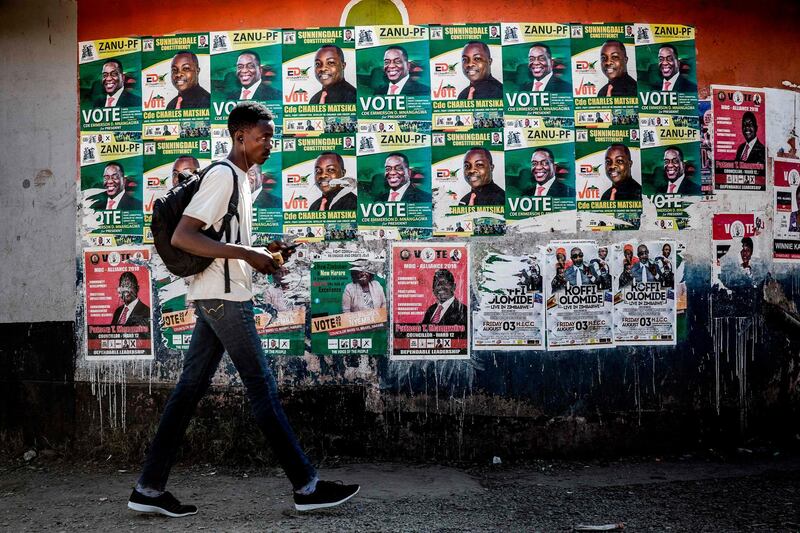Zimbabweans on Monday voted in their first election without Robert Mugabe on the ballot, a contest that could bring international legitimacy and investment or signal more stagnation if the vote is seriously flawed.
The main opposition candidate, Nelson Chamisa, said there was an attempt to "suppress and frustrate" the vote in urban areas where his Movement for Democratic Change (MDC) party has strong support.
Mr Chamisa also said the MDC would win the election unless there was rigging in rural regions, making it likely he will challenge the outcome if his rival, President Emmerson Mnangagwa, wins.
About 5.5 million people were registered to vote in this southern African nation anxious for change after economic and political paralysis during the nearly four-decade rule of 94-year-old Mr Mugabe.
Dozens of people waited in line to vote outside many polling stations in Harare, the capital.
"I want to do this and get on with my business. I am not leaving anything to chance. This is my future," said Emerina Akenda, a first-time voter.
__________
Read more:
Zimbabwe goes to the polls - in pictures
Zimbabwe's ousted president Robert Mugabe says he won't vote for his old party
Editorial: Fairness is crucial in Zimbabwe's post-Mugabe election
__________
Thousands of election monitors have fanned out across the country to observe a process that the opposition says is biased against them despite electoral commission assurances that it will be credible.
President Mnangagwa, 75, took over from Mugabe last year. His rival Mr Chamisa is just 40, a lawyer and pastor who became head of the main opposition party just a few months ago.
A record of more than 20 presidential candidates and nearly 130 political parties are participating. If no presidential candidate wins 50 per cent of the vote, a runoff will be held on September 8.
"This is a critical moment in Zimbabwe's democratic journey," said Ellen Johnson Sirleaf, former Liberian president and a leader of one of the international observer missions.
"The elections today provide an opportunity to break with the past," Ms Sirleaf said at a polling station in a school in Harare. "The lines and voter enthusiasm we are seeing this morning must be matched by an accurate count and their choice must be honoured."
Past elections were marred by violence, intimidation and irregularities, but Mr Mnangagwa, a former enforcer for Mugabe who says he now represents change, has promised that this election will be free and fair.
The presence of Western election monitors for the first time in years is an indicator of a freer political environment, though concerns have been raised about state media bias toward the ruling party as well as a lack of transparency with the printing of ballot papers.
Inside polling stations on Monday, voters were given three ballot papers: one for their presidential pick, another for member of parliament and a third for local councilor. Polling officers helped voters put each ballot paper in the right box.





